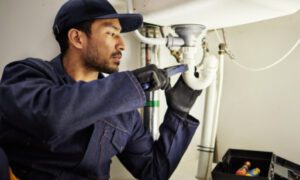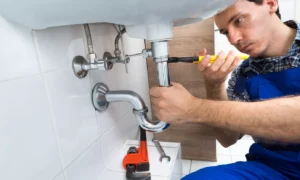Plumbing is an integral part of our daily lives, quietly working behind the scenes to provide us with clean water for drinking, bathing, and cooking while efficiently removing wastewater. We often take it for granted until something goes wrong, and we’re faced with a plumbing issue. That’s when the unsung heroes of the plumbing world come to our rescue – plumbers. Plumbers are the guardians of our plumbing systems, ensuring that everything flows smoothly, and water is where it should be.
In this comprehensive article, we will explore the critical role that plumbers play in maintaining and safeguarding your plumbing system. From their training and expertise to the services they provide, you’ll gain a deeper appreciation for the professionals who keep your water flowing.
The Training and Expertise of Plumbers
Plumbers are highly skilled professionals who undergo extensive training to become experts in their field. Their journey typically begins with formal education and apprenticeships. Here’s a glimpse into the training and expertise that plumbers acquire:
1. Education
Many plumbers start their journey by enrolling in vocational or trade schools. These programs provide a strong foundation in plumbing principles, mathematics, and safety procedures. Additionally, aspiring plumbers learn about local plumbing codes and regulations.
2. Apprenticeships
Hands-on experience is a crucial part of a plumber’s training. Apprenticeships, which can last several years, allow them to work under the guidance of experienced plumbers. During this time, they learn how to install, repair, and maintain plumbing systems while gaining practical insights into the trade.
3. Licensing
In most regions, plumbers are required to obtain licenses to practice professionally. To become licensed, plumbers must pass examinations that assess their knowledge of plumbing codes, safety practices, and industry standards. Licensing ensures that plumbers are competent and capable of delivering high-quality work.
4. Continued Education
The plumbing industry is constantly evolving, with new technologies and techniques emerging regularly. To stay current and enhance their expertise, plumbers often engage in continuing education and training programs. This commitment to lifelong learning ensures that they can tackle a wide range of plumbing challenges effectively.
The Many Roles of Plumbers
Plumbers perform a variety of essential tasks to maintain and repair plumbing systems in residential, commercial, and industrial settings. Let’s delve into some of the crucial roles that plumbers play:
1. Installation of Plumbing Systems
One of the primary responsibilities of plumbers is the installation of plumbing systems in new construction projects. This includes laying out the network of pipes, installing fixtures, and ensuring that everything is in compliance with local building codes. Proper installation is essential to prevent future plumbing issues.
2. Repair and Maintenance
Plumbers are often called upon to diagnose and repair plumbing problems. Whether it’s a leaky faucet, a clogged drain, or a burst pipe, plumbers have the expertise to identify the issue and implement the necessary repairs promptly. Regular maintenance checks can also help prevent potential problems, saving homeowners money and headaches in the long run.
3. Emergency Services
Plumbing emergencies can strike at any time, and when they do, plumbers are the first responders. Whether it’s a midnight pipe burst or a blocked sewer line, plumbers are available around the clock to provide emergency services. Their swift action can minimize damage and help restore normalcy to your home.
4. Upgrading and Remodeling
When homeowners decide to upgrade their kitchens or bathrooms, plumbers are essential partners in the remodeling process. They can install new fixtures, reroute plumbing lines, and ensure that the renovated space functions seamlessly.
5. Inspection and Diagnosis
Plumbers are skilled at inspecting plumbing systems to identify hidden issues. They use specialized tools like cameras to peer inside pipes and detect blockages or damage. By catching problems early, they can prevent major plumbing disasters.
6. Water Heater Services
Plumbers are well-versed in water heater installation, repair, and maintenance. They can help you choose the right type and size of water heater for your home and ensure it operates efficiently.
The Tools of the Trade
Plumbers rely on a range of tools and equipment to perform their tasks effectively. These tools enable them to diagnose issues, make repairs, and maintain plumbing systems. Here are some of the essential tools of the trade:
- Pipe Wrenches: These adjustable wrenches are used to grip and turn pipes and fittings. They come in various sizes to accommodate different pipe diameters.
- Plungers: Plungers are used to clear clogs in drains and toilets by creating pressure to dislodge blockages.
- Pipe Cutters: Plumbers use pipe cutters to cleanly cut through pipes of various materials, including copper, PVC, and steel.
- Augers and Snakes: These tools are used to remove blockages from pipes by either breaking them apart or pulling them out.
- Pipe Cameras: Pipe inspection cameras are equipped with lights and cameras that allow plumbers to see inside pipes and identify issues such as blockages, cracks, or corrosion.
- Propane Torches: Plumbers use propane torches for soldering pipes and fittings, creating secure connections.
- Leak Detection Equipment: This includes acoustic and infrared devices that help plumbers pinpoint the location of leaks in pipes.
The Role of Plumbing Codes and Regulations
Plumbing work must adhere to local plumbing codes and regulations, which are in place to ensure the safety and functionality of plumbing systems. Plumbers are well-versed in these codes and play a vital role in compliance. They ensure that installations meet code requirements, obtain necessary permits, and carry out inspections as required by local authorities. This ensures that your plumbing system not only works well but also adheres to legal standards.
Conclusion
Plumbers are the guardians of our plumbing systems, working tirelessly to ensure that water flows where it should and that our homes and businesses are safe from plumbing disasters. Their training, expertise, and dedication to ongoing learning make them indispensable professionals in our lives. The next time you turn on a faucet, flush a toilet, or enjoy a hot shower, take a moment to appreciate the plumbers who make it all possible. They are the unsung heroes who keep our water flowing smoothly.



































